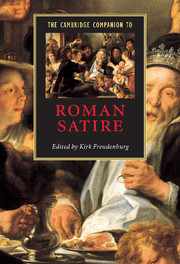Crossref Citations
This Book has been
cited by the following publications. This list is generated based on data provided by Crossref.
2006.
Classics and the Uses of Reception.
p.
294.
2010.
A Companion to Horace.
p.
414.
2010.
Sex.
p.
190.
2011.
A Companion to the Latin Language.
p.
582.
2012.
A Companion to Persius and Juvenal.
p.
545.
Rosen, Ralph M.
and
Keane, Catherine C.
2013.
A Companion to Greek and Roman Sexualities.
p.
381.
Renner, Bernd
2014.
FromSaturatoSatyre:François Rabelais and the Renaissance Appropriation of a Genre*.
Renaissance Quarterly,
Vol. 67,
Issue. 2,
p.
377.
Meijer Drees, Marijke
and
de Leeuw, Sonja
2015.
The Power of Satire.
Vol. 2,
Issue. ,
p.
1.
Bradley, Beatrice
and
Pollard, Tanya
2017.
Tragicomic Conceptions: The Winter’s Tale As Response to Amphitryo.
English Literary Renaissance,
Vol. 47,
Issue. 2,
p.
251.
2017.
BIBLIOGRAPHY.
Ramus,
Vol. 46,
Issue. 1-2,
p.
205.
Poláková, Mariana
2017.
Vznik a vývoj satiry v římské literatuře.
YILMAZ, Tuncer
2019.
KARNAVALİZM, SOKRATİK DİYALOG, MENİPPUSÇU HİCİV VE EREWHON.
Motif Akademi Halk Bilimi Dergisi,
Vol. 12,
Issue. 27,
p.
849.
Foster, Clare L. E.
2019.
The Palgrave Handbook of the History of Women on Stage.
p.
51.
2019.
The Encyclopedia of Greek Comedy.
p.
834.
Damon, Cynthia
and
Farrell, Joseph
2020.
Ennius' <I>Annals</I>.
Pietropaolo, Mariapia
2020.
The Grotesque in Roman Love Elegy.
Sharrock, Alison
2024.
The Cambridge Critical Guide to Latin Literature.
p.
158.





